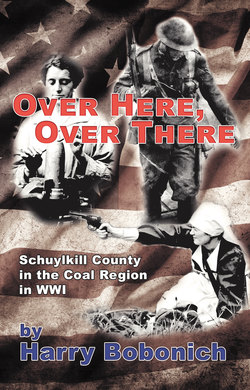Читать книгу Over Here and Over There - Harry Bobonich - Страница 36
На сайте Литреса книга снята с продажи.
Verdun: A Diabolical Inferno
ОглавлениеThe Battle of Verdun was one of the deadliest engagements and also the largest single battle of the entire war. It began on February 21, 1916 and continued on through the middle of December: it was also the most costly of all the battles of the war.
Since the war along the entire Western Front was mired in a stalemate, General Erich von Falkenhayn, Chief of the German General Staff, chose to break the deadlock by focusing on the town of Verdun, which was an important fortress in Lorraine and only 140 miles from Paris.
The war began at 7:15 a.m. on February 21 when the Germans launched a huge bombardment along a 25-mile front. They used 1200 artillery guns to fire off more than two million shells in the opening round, and then began their attack with 140,000 troops. General Falkenhayn told Kaiser William II: “Within our reach there are objectives for the retention of which the French General Staff would be compelled to throw in every man they have. If they do so, the forces of France will bleed to death.”
By the end of February, the Germans made significant gains and captured 10,000 French soldiers. While they eventually captured Fort Douaumont, which was considered to be one of the strongest forts in the world, it turned out that the fort was only lightly defended. Fort Douaumont, which was only five miles from Verdun, was the largest and highest fort on a ring of 19 large defensive forts surrounding the town. While half a million German troops assaulted Douaumont village, the French defenses held their position.
French General Philippe Petain, who was put in charge of defending Verdun, halted the German advance at this point. Petain, in heroic fashion, told his Commander in Chief Joseph Joffre that “lls ne passeront pas” – literally, “They shall not pass.” At the time, there was an obscure junior officer named Captain Charles de Gaulle who was wounded in the fighting, and much later would become the leader of the Free French in World War II and then President of France.
The Battle of Verdun
The Germans renewed their assault and captured Douaumont village early in March. While they continued their attack and make small advances, the bloody stalemate went back and forth through the end of June with both sides taking heavy losses.
On July 1, the French and British then started their massive offensive on the Somme to relieve the French army at Verdun; meanwhile the Russians were also launching an offensive on the Eastern Front. These two threats resulted in the Germans withdrawing some troops from Verdun to support other sectors. Nevertheless, the Germans launched two more attacks, which yielded little gains and by early September the active period of the battle at Verdun was over. Up to this point, the French fired off 10 million rounds of field artillery, more than 1.6 million medium and large-caliber rounds: with all that blood shed and cost, there was little change in the battle lines. Not only were thousands of colonial soldiers from West Africa fighting alongside the French in this battle, they also served in every important theatre where French troops were involved.
In late October the French went on the offensive and retook Douaumont along with 6,000 German prisoners; and in early November they also took back Fort Vaux another fortress, which surrounded Verdun. The persistent Germans began another attack, but only made small territorial gains. The French counterattacked regaining the lost ground and captured 9,000 more German prisoners. On December 18, they captured another 11,00 prisoners: it was the end of the battle of Verdun.
During the 10-month bloody conflict, the French had lost approximately 550,000 killed or wounded and Germans losses were over 430,000--the ground area was totally destroyed. A monument at the Douaumont Ossuary commemorates the bodies of 150,000 unidentified French and German soldiers.
Verdun eventually represented the futility of the entire war as it was fought in the trenches along the Western Front for almost a year: the front had not moved. One French soldier wrote, “Hell cannot be this dreadful.” Ironically, the battle was fought on a relatively small piece of land--and when it was all over, neither side gained any tactical or strategic advantage. (Bidou 2016)
Author Ian Kershaw wrote:
For many among the legions of conscripted soldiers in Europe’s mass armies there may indeed have been little in terms of abstract idealism to begin with. They often fought because they had no alternative. And for many of these, there had been no point to the slaughter.
The poignant words of a Frenchman, written at the western front in 1916 shortly before he fell, stands as a proxy for the sentiments of millions of ordinary soldiers in all combatant armies.
I ask, hoping to understand
This slaughter’s purpose. The reply
I get is ‘For the Fatherland!’
But never know the reason why.
(Kershaw 2015)
General Philippe Petain was a national hero for his victory at Verdun; however, he was discredited as the head of the French government at Vichy in World War II. His death sentence was changed to life in prison where he died: he was buried in a cemetery near the bastille. His wish to be buried at Verdun was never carried out by successive governments.
